Making Changes in the Sea of Cortez One Fisherman at a Time
I met Polo during a dive trip aboard the Quino El Guardian in the Northern Sea of Cortez. He was introduced as a fisherman from an organization called COBI. Polo used to be a fisherman in the Sea of Cortez. They said that Polo was going to be joining us on our dives.
Polo was one of the divers on our panga and I quickly realized that he was an excellent diver. He was as comfortable in the water as any of the hundreds of sea lions we encountered. Once we ran into some strong current and the visibility was poor. But I knew that all I had to do was to keep an eye on Polo’s bright yellow fins and there would be nothing to worry about.
Originally we had heard that COBI was a Mexican organization that helped educate people in small fishing villages about sustainable fishing and marine conservation. But because of a wonderful 6 days of diving with Polo, I wanted to learn more. One evening I asked if I could ask him some questions and he said yes. I am so glad he did.
Leopoldo "Polo" Encinas Bracamontes
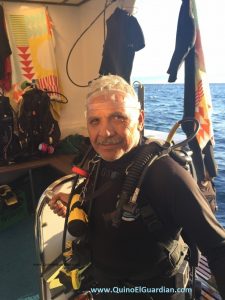
Polo is 58 years old and is from Bahia De Kino, Sonora, Mexico. It is a small coastal community of 5,000 people where 95% of the men were fishermen. He began fishing when he was 20. They would camp at the Midriff Islands and that is how he got to know the islands so well. He started diving in 1980 on hookah (divers are supplied with air through hoses from the surface) for fish, lobster, conch and anything else they could sell. He wasn’t certified; they didn’t worry about things like that.
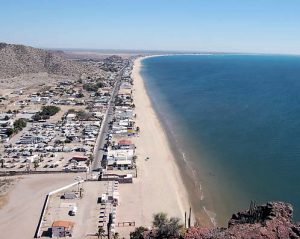
In 2006, a few scientists came to the village from an organization called COBI, the University of Arizona and Prescott College. Prescott College has a field station in Bahia de Kino. They had a project called PANGAS (Pesca Artesanal del Norte del Goflo de California: Ambiente y Sociedad) meant to monitor the islands and the fish count. They told the villagers they were not there to tell them to stop fishing. What they were there to do was learn more about the area and, hopefully, teach them how to fish responsibly.
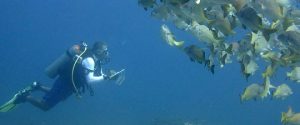
While COBI had scientists and a couple of students and investigators, they didn’t know the area. So they decided to hire two local fishermen. COBI taught them how to dive on SCUBA and got them certified as open water divers. The scientists quickly learned that the fishermen were incredibly efficient. Information that would take the scientists all day to gather the fisherman could collect in an hour. In fact, COBI taught them how to "fish data" instead of "fishing fish". This information was brought back and analyzed by the COBI team.
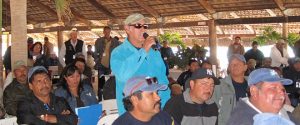
This was such a success that when COBI decided they needed more divers, they asked Polo for help. Polo went to his village and came back with 16 men. Of those, 8 were made into divers. In addition to being amazing divers, they knew all of the local species. COBI taught them how to be scientific divers which included the scientific names of all of the fish and animals. The project became a citizen science project.
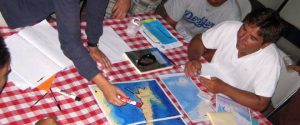
The purpose of the collected information it to help COBI make recommendations to the government and to communities regarding sustainable fishing. In fact, the information they collected was so impactful that changes were made immediately to the betterment of the environment as well as the fishermen. It has also taught the fishermen the importance of protecting their environment and how everyone in the community can participate. Now these divers are contracted out to do different projects all over the Sea of Cortez.
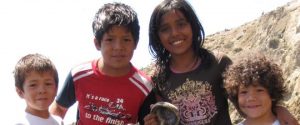
One of the major impacts COBI has made is through empowerment. Different people in the village are responsible for different areas. For example, one person works with turtles. Another is responsible for aquaculture. Polo is responsible for education. There is a lot of volunteer work including cleaning of the islands and beaches and the entire community participates. Ecology is taught in the schools.
The next step will be the further development of ecotourism. Remember that a fish can have its photo taken a hundred times but it can only be eaten once. Tourism can play a much bigger part and, because of COBI, the communities know what they need to do. The only delay is getting them the necessary equipment and a basic training.
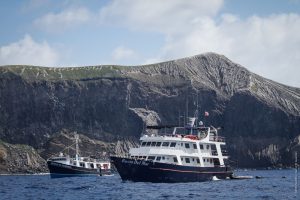
There are organizations out there that are helping. The liveaboard dive boats Rocio Del Mar and Quino El Guardian bring tourists to the Sea of Cortez and show them the positive impacts that COBI is making. Through the Quino’s Citizen Science Program, one fisherman/diver is brought on each trip furthering their education and exposure to tourism.
You can help, too. Through your donations, more communities, like Polo’s, will receive the needed education to help them create responsible fishing programs and develop ecotourism in their areas.
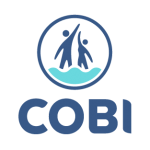
To learn more about COBI, visit www.COBI.org.mx
___________________________________________________________________
Some examples of how COBI has helped fishing villages and communities in the Sea of Cortez:
There are certain seasons for fish. COBI has shown the fisherman how to create aquaculture pens. Some of these fish are put into the pens. These pens house the live fish until the season closes. After the season closes, the fisherman can sell these fish at a higher price. They get more money for the same amount of fish so they can fish less.
COBI has created cooperatives within the village showing the community how they can work together. Originally the fisherman just caught the fish and then it was sold to a packaging plant. The packaging plant would then sell it to a distributor and the distributor to restaurants. Now the village does it all themselves. This allows the fisherman to make more money on less fish.
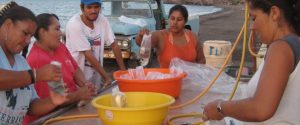
You don’t have to eat a fish to make money. The women of the village were shown the value of decorative fish for aquariums. They were taught about the fish, where and how to catch them, and how to market them. More importantly they gained a great appreciation for the environment in which these fish were raised. These women are now a major contributor to their community. So much so that their husbands now work for them!
Susan Long
September 25, 2016

